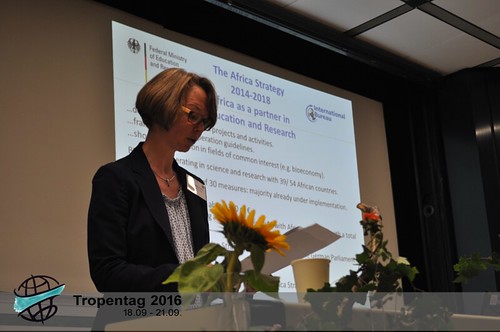BMBF promote Research for development-innovative partnership
 As some BMBF representative reported, the Ministry has a fund of 350 millions euros to be allocated by 2019. In 2016, they have funded about 300 projects together with African partners with a total budget of about 60 million euros, promoting the research in the area of health and medicine and climate change, energy and food production.
As some BMBF representative reported, the Ministry has a fund of 350 millions euros to be allocated by 2019. In 2016, they have funded about 300 projects together with African partners with a total budget of about 60 million euros, promoting the research in the area of health and medicine and climate change, energy and food production.
Six projects in partnership with countries from Africa, Central Asia and South East Asia have been presented on Tuesday afternoon. The one conducted in Egypt and presented by Professor Dirk Selmar seeks to assess the uptake of nicotine from the soil as an example for the horizontal transfer of natural products as a source of contamination for spice and medicinal herbs. The project focused on herbal spice including coriander, chamomile and parsley. Why these herbs? Professor Selmar explained that they are often exports in Egypt, and the average of nicotine found in these herbs has an impact on the whole value chain and probably has been taken up through soil or other external factors. The project is still running. However, this would help to elucidate fundamental principles related to food safety.

Professor Ian Dimzon, insteadm presented another project conducted in the Philippines about the "impact of water quality on aquaculture: target and non-target analysis of trace organic substances and their transformation products". The main idea of the project was to identify pollutants and their sources in an aquaculture system lake, study bio-degradation of the identified pollutants as well as provide technical advice to the communities living around the lake regarding measures to minimize the presence of the identified pollutants.
I believe a strong research community is characterized by its global competitiveness and attractiveness. Research such these ones prove to be a way to build solidarity between the countries and bridge gaps in communities, investigating equitable sharing of resources and benefits as part of the solution. To learn more about BMBF check the following link: https://www.bmbf.de/





Comments
Post new comment